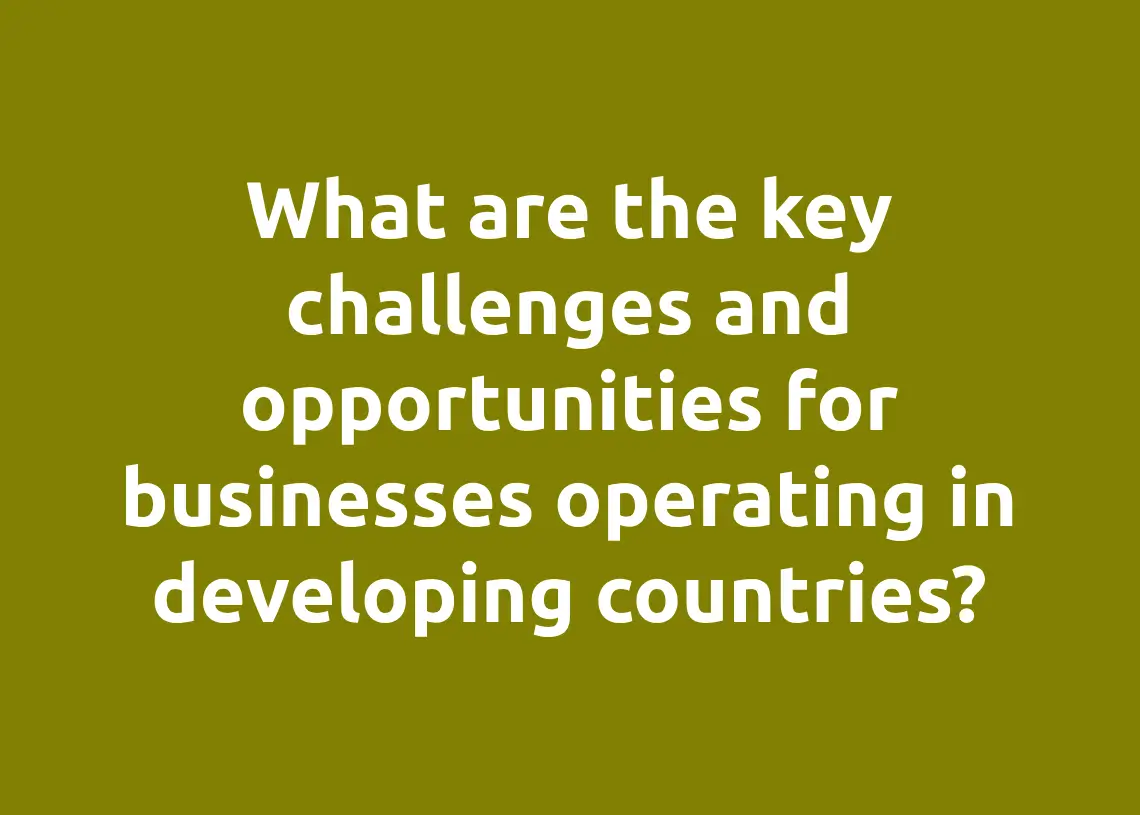As developing countries continue to experience economic growth and globalization, businesses are presented with both challenges and opportunities. While the potential for expansion and increased profitability is clear, businesses must also navigate a variety of unique obstacles that can threaten success.
These challenges can range from political instability and corruption to limited access to resources and infrastructure. However, with careful planning and execution, businesses can overcome these hurdles and thrive in developing markets.
One of the greatest challenges facing businesses operating in developing countries is navigating the complex political and regulatory landscape. Corruption, bribery, and inconsistent enforcement of laws can make it difficult to operate ethically and within the confines of the law. Additionally, businesses may face limited access to resources and infrastructure, including reliable power, transportation, and telecommunications. These issues can make it challenging to operate efficiently and cost-effectively.
Despite these challenges, there are also significant opportunities for businesses operating in developing countries. These markets are often characterized by growing middle classes with increased purchasing power, creating demand for a wide variety of goods and services.
Infrastructure limitations hinder growth potential
One of the key challenges that businesses face when operating in developing countries is infrastructure limitations. In many developing countries, the infrastructure is not up to the standard required to support business operations.
Poor roads, unreliable power supply, inadequate communication networks, and limited access to transportation can all hinder the growth potential of businesses. This can result in higher operating costs, longer lead times in delivering goods and services, and reduced efficiency. Additionally, infrastructure limitations can also lead to a lack of access to markets, which can limit growth potential.
It is essential for businesses operating in developing countries to address these challenges by investing in infrastructure development and identifying ways to work around these limitations. By doing so, businesses can unlock new growth opportunities and improve their overall competitiveness.
Lack of skilled workforce availability
One of the key challenges for businesses operating in developing countries is the lack of skilled workforce availability. Despite the abundance of labor in many developing countries, businesses often struggle to find workers with the appropriate skills and knowledge to meet their needs.
This is particularly true in sectors that require specialized training, such as technology and healthcare. The shortage of skilled workers can lead to increased costs for businesses as they invest in training programs or hire more expensive foreign workers. Additionally, the lack of skilled workers can limit the growth potential of businesses and hinder economic development in the long term.
Addressing this challenge requires a multi-pronged approach that includes investments in education and training programs, as well as policies that promote the development of a skilled workforce. Businesses can play a role in this effort by partnering with local educational institutions to provide training and employment opportunities for students and graduates.
Legal and regulatory complexities abound
One of the key challenges for businesses operating in developing countries is navigating the legal and regulatory complexities that exist in these markets. These complexities can vary significantly from country to country and can be particularly daunting for businesses entering these markets for the first time.
A lack of transparency in the legal and regulatory frameworks can create uncertainty and impede business operations. In addition, corruption and bureaucratic inefficiencies can further complicate matters, leading to delays and increased costs.
However, businesses that are able to successfully navigate these complexities can find significant opportunities for growth and profitability in developing markets. Developing relationships with local partners and consulting with legal experts can help mitigate risks and ensure compliance with local laws and regulations.
Managing cultural and language differences
One of the key challenges for businesses operating in developing countries is managing cultural and language differences. When operating in countries with different cultures and languages, businesses need to be aware of the customs, traditions, and social norms of the local population.
This includes understanding how people communicate, behave, and interact with each other. It is important to be respectful of cultural differences and adapt business practices accordingly. Language barriers can also be a challenge, as it can be difficult to communicate effectively with employees, customers, and other stakeholders.
The opportunity in managing cultural and language differences is to develop a diverse and inclusive workforce that can bring new perspectives and ideas to the business, and to tap into new markets by understanding and respecting the cultural differences of the local population. Businesses that are able to effectively manage cultural and language differences can gain a competitive advantage in developing countries.
Access to reliable financing options
Access to reliable financing options is a key challenge for businesses operating in developing countries. Many small and medium-sized enterprises (SMEs) struggle to secure the funding necessary for growth and expansion. Traditional banks often have stringent lending criteria and may require collateral or a guarantee, which can be difficult for SMEs to provide.
In addition, interest rates on loans can be prohibitively high, making it challenging for businesses to repay the loan and remain profitable. However, there are opportunities for businesses to access financing through alternative sources such as microfinance institutions, venture capital firms, and crowdfunding platforms. These options can provide SMEs with the funding they need to grow and expand their operations, while also helping to stimulate economic growth in the local community.
Developing countries can benefit immensely from the implementation of policies and programs that encourage the growth of alternative financing options for SMEs, as it can lead to increased job creation, higher income levels, and a more vibrant and diverse business landscape.
Navigating political instability risks
One of the significant challenges that businesses operating in developing countries face is navigating political instability risks. Developing countries are often prone to political instability, which can adversely affect a company’s operations.
Political instability can take many forms, such as coups, civil unrest, and protests, among others. These events can lead to disruptions in the supply chain, loss of property, and even closure of business operations. To mitigate the risks presented by political instability, businesses must develop a comprehensive risk management strategy that takes into account the political landscape of the countries in which they operate.
This strategy may include identifying potential risks, monitoring political developments, and developing contingency plans in case of emergencies. Despite the risks, businesses operating in developing countries also have an opportunity to contribute to political stability by being responsible corporate citizens and investing in the local economy.
This can help them gain the support of the local population and the government, which can be crucial during times of political instability.
Poor supply chain infrastructure
Poor supply chain infrastructure is a significant challenge for businesses operating in developing countries. Transportation and logistics in these areas are often poorly developed, which can lead to significant delays, inefficiencies, and added costs for companies.
In some cases, it can even prevent companies from entering these markets altogether. The lack of infrastructure and poor connectivity between different regions can make it challenging to move goods and materials, leading to higher inventory costs and production delays. Additionally, this can also impact the quality of products, as they may be subject to damage or deterioration during transport.
However, this challenge also presents an opportunity for companies to invest in and help develop the supply chain infrastructure in these areas, leading to improved logistics, reduced costs, and increased access to new markets.
Limited technology and innovation adoption
One of the key challenges faced by businesses operating in developing countries is limited technology and innovation adoption. Many businesses in these countries lack access to the latest technologies and struggle to adopt new innovations.
This can lead to a competitive disadvantage when compared to businesses in more developed countries. Additionally, limited access to technology can lead to inefficiencies and slower production times, which can negatively impact the bottom line.
However, this challenge also presents an opportunity for businesses to invest in and adopt new technologies, which can lead to increased productivity, cost savings, and improved competitiveness. Governments and non-profit organizations can play a role in supporting technology and innovation adoption by providing resources, incentives, and training programs for businesses in developing countries.
Balancing social responsibility and Profitability
One of the key challenges for businesses operating in developing countries is balancing social responsibility and profitability. In these markets, companies often face pressure to make a positive impact on society while also generating returns for shareholders.
This can be particularly challenging in industries where labor rights, environmental regulations, and ethical business practices are not well-established or enforced. However, companies that prioritize social responsibility can also reap benefits in terms of brand reputation, customer loyalty, and access to capital.
By adopting sustainable business practices and investing in the communities where they operate, companies can build long-term relationships with stakeholders and contribute to the development of the countries where they do business.
Addressing corruption and bribery risks
One of the key challenges for businesses operating in developing countries is addressing corruption and bribery risks. Corruption and bribery can have a significant impact on a company’s operations, affecting its financial performance, reputation, and ability to conduct business fairly.
Companies that operate in developing countries need to have effective anti-corruption policies and procedures in place to mitigate these risks. This includes conducting thorough due diligence on business partners and third-party agents, implementing internal controls to detect and prevent corrupt practices, and providing regular training to employees on anti-corruption laws and regulations.
While addressing corruption and bribery risks may present challenges, it also presents opportunities for companies to differentiate themselves by demonstrating a commitment to ethical business practices, building trust with stakeholders, and gaining a competitive advantage in the market.
Conclusion: What are the key challenges and opportunities for businesses operating in developing countries?
In conclusion, businesses operating in developing countries are faced with a range of challenges and opportunities. While the challenges of inadequate infrastructure, political instability, and underdeveloped legal systems can be significant, there are also numerous potential benefits to operating in these markets, including access to lower labor costs, emerging consumer markets, and potential government incentives.
Success in these markets requires a deep understanding of local conditions, a willingness to invest in long-term relationships, and a commitment to sustainable and responsible business practices. As developing economies continue to grow and evolve, businesses that are adaptable and responsive to changing local conditions will be best positioned to thrive in these dynamic and promising markets.
Read More in this Category: Click Here




